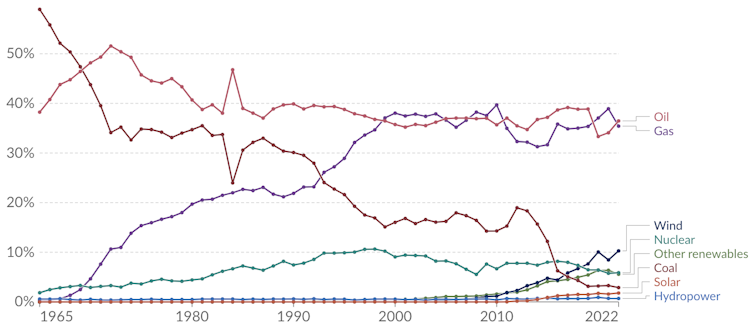lessons from a previous Conservative government struggling with a cost of living crisis
- Written by Jim Phillips, Professor of Economic and Social History, University of Glasgow

Midwinter. War in the Middle East. Energy crisis. Rising prices borne disproportionately by low-wage workers, particularly in a public sector squeezed by a “Tories in turmoil” UK government.
Not December 2023, in fact, but December 1973, as Britain prepared for the three-day working week[1] that commenced on January 1. It arose after the National Union of Mineworkers (NUM), with 250,000-plus members, interrupted the usual supply of coal to power stations with an overtime ban. The union was pushing for an improved pay offer from the miners’ employer, the state-owned National Coal Board (NCB).
Edward Heath’s Conservative government was determined to resist the miners’ claim. Factories, offices and shops deemed non-essential, because they were not providing food, medicines or other everyday vitals, received a government directive to operate either from Monday to Wednesday or Thursday to Saturday. Domestic power was rationed too. Household demand for candles, gas and paraffin heaters, and cooking implements soared. There was also petrol rationing and a road speed-limit of 50mph.
The situation was unprecedented in peacetime Britain. Andy Beckett, in his excellent 2009 book When the Lights Went Out[2], notes that economic output fell by 20%, while 1 million workers were made temporarily unemployed.
Despite the disruption, the miners enjoyed public support. This became evident when Heath called a general election, held on February 28 1974, seeking a fresh mandate for keeping public pay awards below the rate of inflation. A tight contest[3] ensued, from which a Labour government emerged led by Harold Wilson. His first actions included resolving the coal dispute on terms closer to the NUM’s claim than the NCB’s final offer, and ending the three-day week.
What caused the crisis
The crisis had been caused by the big switch in Britain’s energy market from coal to oil. Coal had been king as late as 1957, responsible for 80%[4] of energy consumed in Britain. The situation began shifting, however, with an increase in imported oil from the Middle East.
Oil was cheap, and its energy share shot up to overtake coal in 1970[5]. Accompanied by the rise of natural gas and introduction of nuclear energy, the coal miners felt this transition was unjust. Employment in the mines had halved in the 1960s. Job alternatives in engineering and manufacturing were not growing[6] quickly enough to absorb further redundancies.
UK energy consumption, 1965-2022







